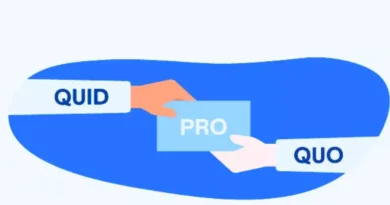Why Is Quid Pro Quo Illegal?
While “quid pro quo” refers to a mutual exchange and is common in legal transactions, it becomes illegal when it involves unethical or unlawful activities. For instance, in cases of bribery, offering something of value to a public official in return for favorable treatment is prohibited. Similarly, quid pro quo sexual harassment, where employment benefits are conditioned on sexual favors, violates laws such as Title VII of the Civil Rights Act of 1964. These actions are illegal because they exploit power imbalances, undermine fairness, and compromise the integrity of institutions.
Takeaways
| Key Points |
|---|
| Quid pro quo, meaning “this for that,” can be legal or illegal depending on the context, but it becomes unlawful when it involves exchanging something of value, such as money, power, or influence, for benefits not legally owed or when used for coercion. |
| In the workplace, quid pro quo harassment occurs when someone in authority demands sexual favors in exchange for job-related benefits like promotions or raises, a clear abuse of power that violates Title VII of the Civil Rights Act of 1964, which prohibits discrimination based on sex. |
| Employers are legally obligated to prevent and address such behavior as it undermines workplace equality, creates a toxic environment, and may result in lawsuits, financial penalties, or reputational harm, making proactive measures like policies and training critical for compliance and protection. |
Introduction
Quid Pro Quo itself isn’t illegal – it just means “something for something.” It becomes illegal when the exchange involves something improper, like a bribe (offering something of value for official influence) or extortion (threatening harm unless a demand is met).
What is quid pro quo?
“Quid pro quo” is a Latin expression signifying a reciprocal exchange of goods or services. A reciprocal dance of exchange, where one offering calls forth another, a delicate balance of give and take. Quid pro quo agreements are standard in business and politics and can be perfectly legal. However, quid pro quo can also describe unethical or illegal behavior, such as bribery and extortion.
Is quid pro quo illegal?
Whether or not quid pro quo is illegal depends on the specific circumstances. In general, quid pro quo is illegal if it involves exchanging something of value, such as money, power, or influence, for something not legally due to the other party. For example, it would be illegal for a government official to offer a contract to a company in exchange for a bribe.
Quid pro quo harassment is a restricted type of quid pro quo in the workplace. It occurs when a supervisor or other person in authority demands sexual favors from an employee in exchange for job-related benefits, such as a promotion or raise. Quid pro quo harassment is illegal under both federal and state law.
Why is quid pro quo illegal?
Quid pro quo harassment is illegal because it fundamentally undermines the principles of equal opportunity and fair treatment in the workplace. This type of harassment occurs when someone in a position of authority demands sexual favors in exchange for job benefits, such as promotions, raises, or continued employment. It is prohibited under federal laws like Title VII of the Civil Rights Act of 1964, which aim to prevent discrimination based on sex.
Courts view quid pro quo harassment as a clear abuse of power that directly violates an employee’s right to a workplace free from sexual coercion and discrimination. Such actions not only harm the victim’s professional opportunities but also create a toxic work environment, making it imperative for organizations to take swift and effective measures to prevent and address this form of harassment.
Legal Foundation of Quid Pro Quo Harassment Prohibition
Quid pro quo harassment is illegal under federal and state laws, most notably Title VII of the Civil Rights Act of 1964. This landmark legislation prohibits employment discrimination based on race, color, religion, sex, or national origin, including sexual harassment. Quid pro quo harassment falls under this category because it constitutes a form of sex discrimination where employment benefits are conditioned on the acceptance of sexual advances.
The law’s intent is to ensure that employees can perform their jobs without being subjected to coercion or exploitation by those in positions of authority.
Nature of Quid Pro Quo Harassment
Quid pro quo harassment involves a clear abuse of power, where a person in authority (like a supervisor or manager) uses their position to demand sexual favors in exchange for job-related benefits or to avoid negative consequences. This type of harassment is particularly egregious because it directly impacts the victim’s professional life, either by offering rewards for compliance or by threatening punishment for refusal. Examples include linking promotions, raises, or even continued employment to the fulfillment of sexual demands.
Impact on the Victim and the Workplace
The effects of quid pro quo harassment extend beyond the immediate victim, creating a ripple effect throughout the workplace. Victims often face severe professional consequences, such as demotions, denied promotions, or even termination, simply for refusing to comply with inappropriate demands. This not only stifles their career growth but also causes significant emotional and psychological distress, leading to a hostile work environment that can affect overall productivity and morale.
Legal Consequences for Employers
Employers are legally obligated to prevent and address quid pro quo harassment in their workplaces. Failure to do so can result in significant legal repercussions, including lawsuits, financial penalties, and damage to the organization’s reputation. Courts require that victims prove that the harassment resulted in tangible job consequences and that the harasser’s conduct was a significant factor in causing harm. This places a legal burden on employers to maintain a harassment-free work environment and to take immediate action when such claims arise.
Importance of Legal Action and Prevention
Victims of quid pro quo harassment have the right to seek legal recourse. Legal actions can include filing complaints with the Equal Employment Opportunity Commission (EEOC) or pursuing civil litigation. Employers are encouraged to implement strong anti-harassment policies, conduct regular training, and ensure that there are clear reporting mechanisms in place to address harassment complaints promptly and effectively. Proactive measures are essential to protect employees and to mitigate the risk of legal action against the company.
FAQ
What makes quid pro quo arrangements illegal?
Quid pro quo becomes illegal when it involves exchanges that are unethical or violate laws, such as bribery or sexual harassment. For example, offering money to a public official for favorable treatment constitutes bribery, which the law prohibits.
How does quid pro quo relate to bribery?
Quid pro quo in bribery refers to offering something of value to influence a public official’s actions. This undermines public trust and the integrity of governmental operations, leading to legal prohibitions against such conduct.
Why is quid pro quo sexual harassment unlawful?
Quid pro quo sexual harassment occurs when employment benefits are conditioned on sexual favors. This violates Title VII of the Civil Rights Act, which prohibits employment discrimination based on sex, ensuring a fair and safe workplace.
Are all quid pro quo transactions illegal?
No, not all quid pro quo transactions are illegal. Many everyday transactions involve lawful quid pro quo exchanges, like purchasing goods or services. It becomes illegal when the exchange involves unethical or unlawful activities, such as bribery or coercion.
How does quid pro quo affect workplace dynamics?
Quid pro quo arrangements in the workplace, especially involving sexual harassment, can create a hostile environment, leading to decreased morale, productivity, and potential legal consequences for employers. Such practices are prohibited under employment discrimination laws.
What legal frameworks address quid pro quo corruption?
Laws like the U.S. federal bribery statute criminalize quid pro quo arrangements involving public officials. These laws aim to prevent corruption by prohibiting exchanges where personal gain influences official actions.
Can quid pro quo exist without explicit agreements?
Yes, quid pro quo can be implied through actions or circumstances, even without explicit agreements. For instance, if a supervisor’s behavior suggests that sexual favors are expected for job benefits, it constitutes quid pro quo harassment, which is illegal.
How do courts determine if a quid pro quo arrangement is illegal?
Courts assess whether the exchange involves unethical conduct or violates specific laws, such as those against bribery or discrimination. They examine the intent, the nature of the exchange, and its impact on public interest or individual rights.
What are the consequences of engaging in illegal quid pro quo?
Engaging in illegal quid pro quo can lead to criminal charges, fines, imprisonment, and civil liabilities. It can also damage reputations and result in employment or public office loss.
How can organizations prevent illegal quid pro quo practices?
Organizations can implement clear policies, provide training on ethical conduct, establish reporting mechanisms, and enforce disciplinary actions to prevent illegal quid pro quo practices, fostering a culture of integrity and compliance.










Comments are closed.